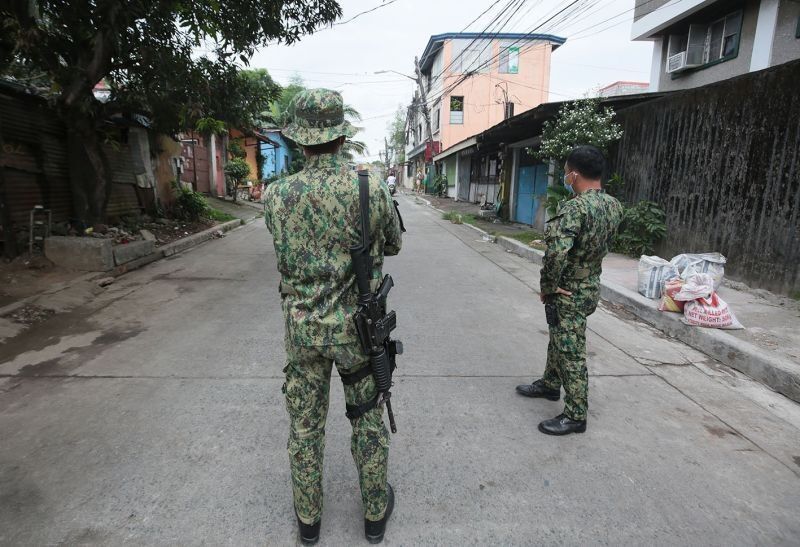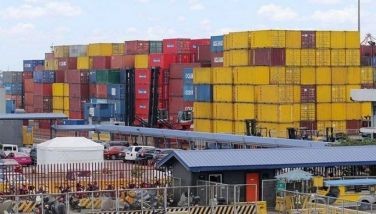After curfews, checkpoints threaten to stage a comeback

MANILA, Philippines (UPDATE 2 4:47 p.m., March 10)— After curfews and lockdowns, a common sight in tighter movement restrictions is “most likely” to stage a comeback: checkpoints.
The police are not ruling out manning the roads again if and when called as part of a fresh effort to bring down coronavirus cases in Metro Manila. But at this early, industries blocked by checkpoints last year are raising red flags the same may incur double the pain this time.
On Friday, the Philippine National Police (PNP) signaled authorities are ready to put up checkpoints in areas where localized lockdowns are in effect. “If the movement of people and goods is affected since the economy reopened...Most likely what happens is an increase in personnel and checkpoints,” Police Brig. Gen. Ildebrandi Usana, spokesperson, said in a phone call.
This has already started. On Friday afternoon, the Muntinlupa local government announced checkpoints would be re-installed in barangay boundaries, coupled with a stricter enforcement of 3 a.m. curfew. Usana said the police would be guided by guidelines from pandemic task force, but the job on containing the latest surge highly rests on cities, municipalities and provinces.
The return of checkpoints also creates a mismatch with national government rules. Under government quarantine levels assessed every month, checkpoints are not supposed to be put up in areas under general community quarantine or looser, which the entire archipelago is at, at least until March 31 before President Rodrigo Duterte comes up with a new order.
"Just like before, we should just make sure that checkpoints won't impede the flow of goods and cargoes, and workers," Trade Secretary Ramon Lopez said in a Viber message when asked to comment about the likelihood of checkpoints.
Checkpoints are following a granular approach to lockdowns. San Juan and Caloocan re-imposed curfews, while Quezon City placed 2 more areas under tight watch. Manila locked down three barangays said to have 10 or more recorded infections to prevent their spread, and Mayor Francisco “Isko” Domagoso told ANC he “will not hesitate” to expand that if needed.
Indeed, COVID-19 cases had seen a resurgence with over 3,000 cases for the three of the past four days nationwide, while Metro Manila saw a spike in hospitalizations. But while smaller lockdowns were preferred, reinstituting checkpoints may be another matter, and something likely to prohibit more than what is acceptably restricted, including food and essential supplies.
“That’s really a law enforcement and public health issue, but they should think about how to implement the free-flowing of goods…The real issue here if the delivery of goods is delayed, people think something’s wrong,” Paul Santos, chair of the Philippine Retailers Association, an industry group, said in a phone interview.
“There are a lot of unforeseen effects,” he added.
Back to square one?
There is basis to this. Almost at the same time last year, retailers such as supermarkets were struggling to fill up grocery shelves after the draconian quarantine was swiftly implemented without proper planning. That happened after COVID-19 cases, initially thought to have been under control, spiked with more testing that came later than most of our Southeast Asian peers.
This time, lockdowns, curfews, and now even potentially checkpoints— basically the recipe of 2020 pandemic response blamed for economic deterioration— are likewise coming on the heels of something else that is delayed: vaccination. It also came after presidential spokesperson Harry Roque assessed that the Philippines excellently handled the pandemic, without citing any basis.
Worse, checkpoints, and their inadvertent effect of restricting goods flow, may end up worsening an already-elevated inflation because supplies end up getting choked in these areas. “It’s basically a risk,” Santos said.
Steven Cua, president of Philippine Amalgamated Supermarkets Association, a group of community markets, agreed. “One example is pork. There is lack of pork supply and that started last year and when we checked, essentially what happened was pork from other provinces are being blocked in Metro Manila,” he explained.
That can potentially be a problem now that more localized lockdowns are being enforced. “Last year, the problem was some were worried of allowing travelers from other areas to enter because of the virus,” he said by phone.
There may be cases that businesses have already adopted to ever-changing restrictions and checkpoints may be easily handled, but for Cua, the broader economy is the most at risk with the return of prohibitions.
“Most supermarkets would have adjusted by now, but nobody wants to go back to lockdown. We want consumers out,” Cua said.
Aside from goods, employees too
The bad government record on implementing lockdowns had also made employers worried about their workers now that checkpoints are again being considered. “Whether we like it or not, localized is okay ... For us, nothing will really change because there are passes,” said Sergio Ortiz-Luis, president of Employers Confederation of the Philippines.
“It’s just too expensive (for businesses). We have to shuttle our employees of course. Also hopefully the implementation of lockdowns across borders will be uniform if they have checkpoints,” he said.
Editor's note: Added Trade Secretary Lopez's comment, Muntinlupa and Quezon City developments.
- Latest
- Trending






























